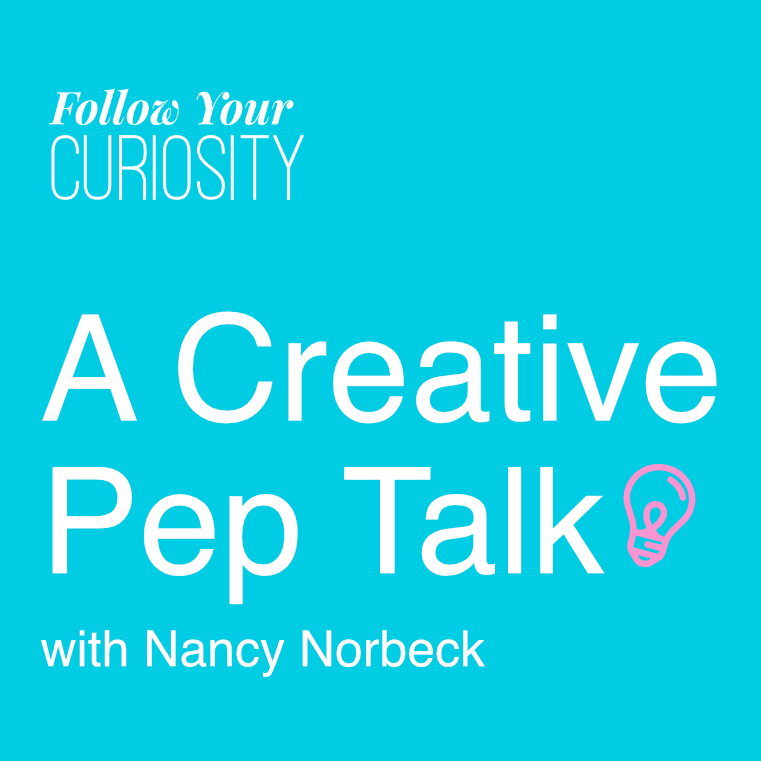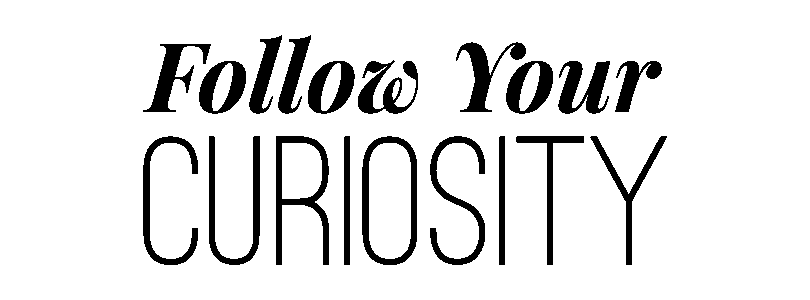
What’s your truth? Do you know? You might not—we’re often not taught how to tell what’s true for us, and instead, we’re told what should be true for us. So why should we care, and how do we find out? I’ll give you some suggestions in this short episode.
Want more tips? Check out this playlist with all my previous Creative Pep Talks!
Could you leave a review? It’s really easy, and it helps SO much. Thanks!
Join my free creative community, The Spark! We celebrate each other’s creative courage, and I’ll be sharing programs for subscribers and listeners there in the coming months.
Get in Touch
I’d love to hear your feedback, questions, and experience with these ideas! Send me a note at fycuriosity.com, or contact me on Instagram, or Bluesky.
Subscribe!
You can subscribe to Follow Your Curiosity via the handy links at the top of the page for Apple Podcasts, Spotify, iHeart Radio, TuneIn, and YouTube. If you enjoyed the episode, don’t forget to tell your friends!

Transcript: What’s Your Truth?
Please note: This is an unedited transcript, provided as a courtesy, and reflects the actual conversation as closely as possible. Please forgive any typographical or grammatical errors.
Nancy Norbeck [00:00:06]:
Welcome to Follow Your Curiosity. Ordinary people, Extraordinary creativity. Here’s how to get unstuck. I’m your host, creativity coach, Nancy Norbeck. Let’s go.
Nancy Norbeck [00:00:19]:
Hey, everybody. This is Nancy Norbeck with this week’s Creative Pep talk. And it’s really interesting. This week I wanted to talk about what’s your truth. I’d been thinking about this for a little while and so it was already on my mind. And then this morning I found out that my senator, Cory Booker, had been already for more than 12 hours by the time I found out. Been speaking on the Senate floor. And it just fits so perfectly with the theme because Cory Booker has been speaking his truth for now nearly 24 hours as I’m recording this.
Nancy Norbeck [00:01:01]:
And it’s really had me thinking all day, as this has been going on even more, about why it’s important to know what your truth is and to stand in your truth. And this is not a political episode. But you may have a different opinion than I have about Cory Booker, but I’m finding what he’s doing really, really inspiring because I think that most of us don’t always know what our truth is. I think we let ourselves get thrown off of our truth by all of the messages that we get from outside of us because we’re not often encouraged in our culture to hear what’s coming from inside of us. And so a lot of the time, we don’t really even know how to pay attention to what’s coming from inside of us. A lot of the signals that we.
Nancy Norbeck [00:01:54]:
Get that point us toward our truth.
Nancy Norbeck [00:01:57]:
Actually come not only from inside of us, but from our bodies and signals that are physical, signals that we’ve never been taught how to follow. So we actually have to learn how to pay attention. And what different signals that we’re receiving in our bodies, different sensations are trying to tell us. But even if we ignore that for now, which I hate to say, because we need to start paying attention to those things, they’re really valuable. Even if we only go with what’s going on up in our heads between our ears, we still often have learned better how to ignore our own instincts, our own thoughts, our own desires, our own perceptions that our own truth is a mystery to us. And I know in my own experience, many times I have been really frustrated when someone well meaning and possibly wiser has said to me, when I say, I don’t know what I want to do, has looked at me and said, yes, you do. And I’ve thought, well, you know, if I knew what I wanted to do, I wouldn’t be asking you, pal. So, you know, can you be helpful here? Because that’s not helpful.
Nancy Norbeck [00:03:16]:
Obviously, I don’t know what I want to do. And I think usually what that person means is somewhere deep inside, you do know. The problem is, obviously, if we did know, we wouldn’t be asking the question, right? If we knew how to access that knowledge, we wouldn’t be asking the question. So we have to learn how to get in touch with our truth. And there are ways to do that. One is to start listening to your body and figuring out, you know, generally speaking, if you clench up at something, that’s a sign that you. You shouldn’t do it, that there’s a part of you that knows this is not a good thing. And if you relax and open, generally, that’s more of a yeah, okay, this is all right.
Nancy Norbeck [00:04:02]:
This is a yes, this is something I should do or want to explore or I feel safe now kind of reaction. Generally speaking, your own signals may vary. You got to figure that out for yourself. There are also, you know, ways to get in touch with what’s really going on deeper inside. Journaling. Journaling is one of them. People talk about journaling. I just had this conversation with Wendi Gordon, and I’m going to put that up on Substack and maybe.
Nancy Norbeck [00:04:34]:
Probably on YouTube and maybe somewhere else as a podcast. We’ll see. But, you know, people talk about journaling as a way to get things out. I think it’s a way to get in. In my experience, journaling brings up things I need to know. It brings up my truth. It brings up additional questions I need to explore, if I’m smart. And usually they’re pretty obvious, because as soon as that question comes up, I go, “Ooh, ooh, hi.
Nancy Norbeck [00:05:03]:
There’s one I need to mark for later,” and come back to it as a new prompt later. And that will bring up new stuff. So. And when I say bring it up, it’s not necessarily like dredging up icky stuff. It just brings up new ideas, new questions, new stuff to explore, new stuff I didn’t know was there. But it’s all about figuring out what your truth is. And sometimes it’s really obvious. Sometimes you don’t have to go through all of this.
Nancy Norbeck [00:05:29]:
But I think one of the most important things we can do is find our truth, know our truth, and stand in our truth. Don’t let other people push us out of our truth, because as soon as we get pushed out of our truth, we tend to end up in trouble. And the more we can stand in our truth and stand up for what we know is right for us, stand up for what we believe, the better we tend to do. The more I listen to myself, the more I notice things tend to go better. I’m going to bet the same is true for you. And that’s true for your creative projects as much as is true for anything else. If you let other people tell you how to do your creative work, you’re probably going to turn out crappy creative work. You’re not going to be happy with it, and neither is anybody else.
Nancy Norbeck [00:06:17]:
And I’m guessing you didn’t need me to tell you that. You’ve probably experienced it for your yourself. But just in case, there it is. So what’s your truth? Where have you seen other people stand in their truth? How does that inspire you? What do you want to do with your truth once you have it? If you already have it, what are you doing with it? What more do you want to do with it? Just some stuff to think about because I think truth is pretty important. So anyway, I think history might be made today, by the time you get to hear this, so we’ll see. And in many ways it already has been, so that’s cool. But go figure out what your truth is if you don’t already know. And if you do, do something awesome with it.
Nancy Norbeck [00:07:02]:
And with that, I’ll see you next time.
Nancy Norbeck [00:07:05]:
If this episode resonated with you, or if you’re feeling a little bit less than confident in your creative process right now, join me at the Spark on Substack as we form a community that supports and celebrates each other’s creators Creative Courage. It’s free and it’s also where I’ll be adding programs for subscribers and listeners. The link is in your podcast app, so sign up today. See you there and see you next week. Follow Your Curiosity is produced by me, Nancy Norbeck with music by Joseph McDade. If you like Follow Your Curiosity Please subscribe, rate and review on Apple Podcasts or wherever you get your podcasts. And don’t forget to tell your friends. It really helps me me reach new listeners.
